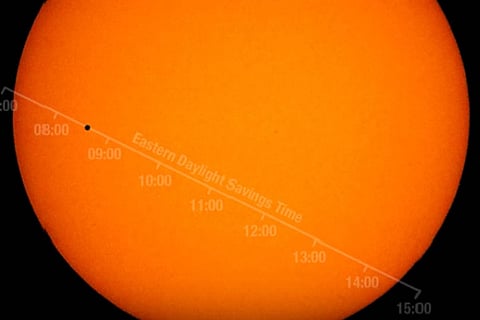

In a relatively rare celestial event called the planetary transition, the sun, Mercury and Earth will line up on Monday to offer a marvellous view of the solar system's inner-most planet travelling across the sun's bright disc.
On May 9, Mercury’s transition across the sun will start at 7:12 am EST (4:42 pm IST) and will last for seven-and-a-half hours.
Mercury's orbit around the sun takes 88 Earth-days, but it is indiscernible when not in alignment with the Earth and the sun. This makes Mercury's transition a rare event observed only about 13 or 14 times every 100 years.
According to NASA, "Mercury will appear as a small black dot as it crosses the edge of the sun and into view at 7:12 a.m. The planet will make a leisurely journey across the face of the sun, reaching mid-point at approximately 10:47 a.m., and exiting the golden disk at 2:42 p.m. The entire 7.5-hour path across the sun will be visible across the Eastern United States – with magnification and proper solar filters – while those in the West can observe the transit in progress after sunrise."
The angle of transition will appear different depending on the viewing point on Earth. This is because Mercury's orbit is tilted 7 degrees more with respect to Earth.
“Mercury's tiny disc covers only a tiny fraction of the sun's blinding surface”, says NASA. “Mercury is too small to be seen without magnification.”
The transition can be viewed with a telescope or binoculars that have been outfitted with a solar filter to protect the eyes. Unfiltered sunlight can damage the eyes. NASA and the European Space Agency will also livestream the event.
Transits have previously been used to understand the solar system better. In 1700s, scientists calculated the distance between the Earth and the sun by monitoring Venus's transits. Mercury's 2016 transit will be closely observed to study the planet's thin exosphere and improve understanding of how to observe planets beyond the solar system.